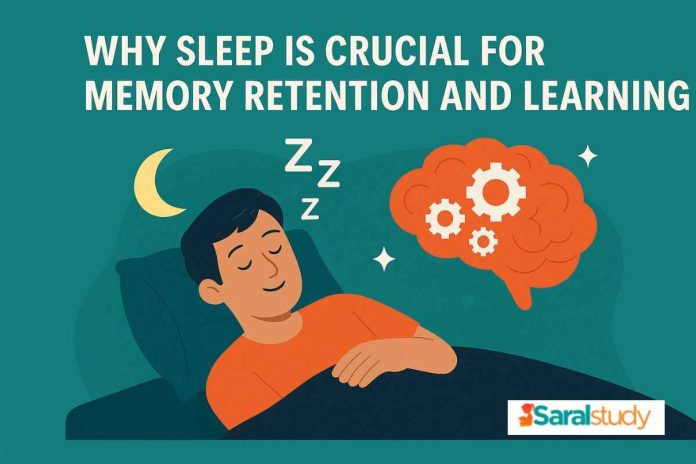Sacrificing your sleep to study more is doing more damage than you think. While it may seem like utilizing every hour of the day for study leads to better outcomes, the reality is quite the opposite. Lack of proper rest can negatively impact your brain, especially when it comes to sleep and memory retention. You’ll be surprised to know that cutting down on sleep actually weakens your ability to learn and remember effectively.
Impact of sleep on brain function
Very often, we assume, when we sleep, our body and brain are at rest, almost not indulging in any form of activity.
Here’s the fact: while at sleep, our brain is actively working on our memory.
The newly acquired information is strengthened and integrated into long-term memory networks, often referred to as consolidation, according to research done by the National Library of Medicine.
In simpler words, all the information and learning material that you study, experiences that you acquire, are converted into memory while you sleep.
This process takes place in two key phases: the first one when you are awake and encoding the new information, and at night when you are fast asleep.
Therefore, as much as studying is important while you’re awake, your sleep is too.
Studies with high school students studying German vocabulary revealed that students retained many more words when they slept overnight after learning as compare to those who remained awake.
The effect was strongest when sleep occurred a few hours following learning, rather than extended wakefulness. Not only does sleep have a relationship with memory and learning, but sleep duration and brain function show a clear relationship too.
According to research findings, sleeping 7-9 hours per night is crucial for brain function, especially cognitive functions such as memory, reasoning and speed of information.
On the other hand, ironically, both shorter, that is, less than 7 hours and/ or longer that is more than 9 hours, of sleep durations have detrimental effects on brain function.
Best Sleep practices for students
-
Best duration of sleep
You’ll be surprised to know how better sleep could positively impact your actions. Research with college students found that every addition of an hour to one’s average night sleep duration was associated with a 0.07 increase in GPA.
Therefore, it can be concluded that an increase in sleep increases academic performance and vice versa. Based on various research, the average sleep duration should be 7-9 hours every night. Not less, not more, as both of these harm our minds and cognitive function.
2. Best Time to Sleep
According to recent research, sleeping for the ideal duration of time is not enough. MIT research revealed that students who went to bed after 2 a.m. performed poorly on tests regardless of total sleep duration.
Therefore, the timing of sleep matters as much as the duration of sleep. It emphasises maintaining regular bedtime and wake-up times.
3. Sleep hygiene
Sleep hygiene is not limited to clean bedsheets and pillow covers, although they are equally important.
Sleep hygiene also caters to the temperature and brightness of the environment you take your sleep. Melatonin, an important biochemical, is responsible for your sleep. For melatonin to kick in, your body requires a cool temperature, approximately 60-70 degrees Fahrenheit and a dark and quiet space.
The blue lights from screens of various devices such as mobile phones, computer screens, etc, suppress melatonin production and interfere with natural sleep onset. Therefore, avoid the use of electronic devices 30-60 minutes before bedtime.
4. Honour your circadian rhythm
Circadian rhythm is our body’s internal clock. It knows when to wake and when to sleep.
But with technological advancements and modern human lifestyle, we often disrupt our circadian rhythm. Circadian rhythm consists of feelings of arousal in the morning, especially with light exposure on our body, and it also consists of a lousy feeling we get when we feel sleepy. We disrupt our circadian rhythm daily by using our screens at night, not exposing our bodies to sunlight in the morning, and not exercising regularly.
Not only does a better circadian rhythm improve our sleep quality, but it also uplifts our mood and makes us feel more active and healthy.
Tips to improve sleep quality before exams
-
Pre-Sleep Routine
Research shows that consistent pre-sleep routines help the brain to recognise bedtime cues, which facilitate sleep onset.
It is advised to begin winding down 30-60 minutes before intended sleep. This could include changing into your night clothes, stretching, reading, doing a skin care routine, making a to-do list or even journaling.
2. Physical Exercise
It cannot be emphasised enough why physical exercise of any form is beneficial for your body and mind. It activates body and brain muscles, releases happy hormones, helps create a routine, and makes you disciplined. Research has shown that physical exercise helps improve sleep quality, especially if done in the morning, as it helps regulate circadian rhythm.
3. Practice Relaxation Techniques
Relaxation techniques such as meditation, stretching or breathing exercises soothe your nervous system and reduce arousal and stress. This facilitates the winding down of your mind and body. You can start as small as a 5-minute meditation or stretching before sleep.
4. Avoid caffeine
Caffeine is a naturally occurring stimulant found in various plants like coffee beans, tea leaves, and cocoa beans. Caffeine can increase alertness, reduce fatigue, and improve concentration. However, excessive consumption can lead to side effects like anxiety, insomnia, and jitters.
Exam stress may make you want to drink coffee for better alertness while studying, but also avoid taking caffeine 2-4 hours before going to bed for better quality sleep.
5. Warm Baths
You must be aware of the benefits of ice-cold showers, which arouse your body, making it feel more awake and alert.
Similarly, in the other way, warm baths are beneficial to promote better sleep, as they make one feel more relaxed. Also, the rise and subsequent fall in body temperature after a warm bath can promote sleepiness. The timing should be 1-2 hours before bed to allow core body temperature to decrease appropriately.
6. Preparation for the next day
When settling into bed to sleep, our brain replays the day in our mind, making us feel guilty of everything we didn’t do. Rarely, one sleep peacefully and contentedly nowadays. We are often stressed by our future events.
Laying out our clothes for the next day, preparing materials for the next day, or writing a brief to-do list several hours before sleeping can help clear the mind of concerns and facilitate mental relaxation. It makes you feel prepared and relaxed.
Conclusion
In summary, sleep is essential for memory retention and effective learning. While it may seem efficient to sacrifice sleep for extra study, research shows this harms memory consolidation and cognitive performance. During sleep, the brain actively processes and stores new information, embedding it into long-term memory networks. Both the duration and timing of sleep matter—aiming for 7-9 hours per night and maintaining a consistent sleep schedule are crucial for optimal brain function.
Poor sleep, whether too little or too much, and irregular sleep patterns can negatively impact academic performance, reasoning, and information processing.
Students can enhance their academic success by prioritising good sleep hygiene: creating a cool, dark, and quiet sleep environment, avoiding screens before bed, and establishing a calming pre-sleep routine. Honouring the body’s natural circadian rhythm through regular sleep and wake times, morning sunlight exposure, and physical activity also supports better sleep quality and mood. Simple practices like relaxation techniques, avoiding caffeine before bed, and preparing for the next day can further improve sleep.
Ultimately, sleep is not a luxury but a necessity—investing in healthy sleep habits is one of the most effective ways to boost learning, memory, and overall well-being.
Read Also: The Power of Positive Thinking in Competitive Exam Preparation





